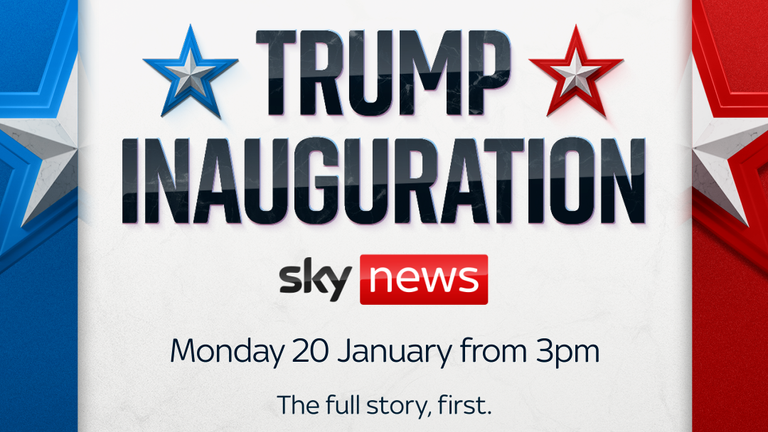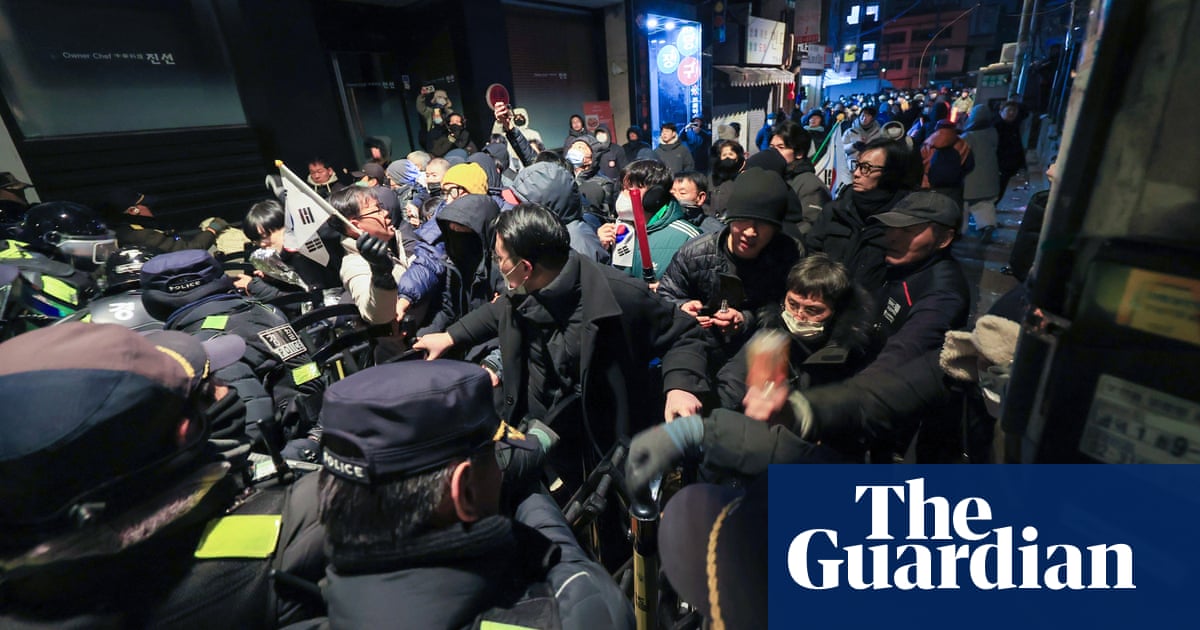In the hours before Donald Trump’s inauguration the world is preparing for a presidency that has huge implications for international security, global trade and the fight against climate change.
Here Sky News’ correspondents explain what Trump 2.0 could mean for their area of expertise.
Is Trump about to end the Ukraine war in a day?
Deborah Haynes, security and defence editor
Donald Trump will want to strike a deal on Russia’s war in Ukraine that brings him a “win” for ending the fighting, but without also gifting a victory to Vladimir Putin.
Crucially, any settlement must be acceptable to Ukrainian President Volodymyr Zelenskyy, who has spent the past few months working hard to impress the value of Kyiv as an ally upon the incoming US leader – and the global menace posed by an emboldened Moscow.
Such a tricky balancing act – after almost three years of all-out war, hundreds of thousands of casualties and millions of Ukrainians displaced from their homes – will require careful, patient diplomacy.
This was not always a feature of Mr Trump’s first term in office, though his unpredictable, forceful style could yet bring something new to the table that enables the two warring sides to compromise in ways that had previously been impossible to imagine.
In a sign of reality biting, previous claims by the president-elect that he could end the conflict in a day have become less binding. General Keith Kellogg, his envoy to Ukraine and Russia, now says he hopes to secure a deal within the first 100 days of a Trump presidency.
Read Deborah’s full analysis here
Read more:
Trump’s swearing-in ceremony to be moved
Melania: The first lady who makes her own rules
How reality TV and cameos helped get Trump to the White House
For Europe, Trump means a reset
By Adam Parsons, Europe correspondent
In Europe, the inauguration of Donald Trump will mean a reset in politics, trade and security.
Europeans have heard him talk about cutting support for Ukraine, introducing tariffs and forcing NATO members to massively increase defence spending. The question, as ever, is whether his actions will match his rhetoric.
Mr Trump has promised a rapid end to the Ukraine war, but he hasn’t said how. If Russia, after so much time and loss of life, felt it was suddenly in the ascendency over a weakened Ukraine, it might demand the sort of deal that would unsettle the whole of Eastern Europe.
Mr Trump has previously been ambiguous about his support for NATO, so there will be plenty across Europe who push for their nations to spend more on defence and be less reliant on America.
And Denmark will continue to push back hard against Mr Trump’s intention of either buying or seizing Greenland. The Danes will expect, and surely receive, wholehearted backing from both the EU and NATO.
But the diplomats have their work cut out. Mr Trump is likely to introduce more tariffs against some countries, most notably China.
But will he do the same to Europe, or will he decide that it’s better to bring old friends into the tent? Certainly, Europe – struggling with poor growth in its biggest economies – would desperately want to avoid tit-for-tat tariffs.
Read Adam’s full analysis here
Trump might not be as damaging to climate action as some fear
By Victoria Seabrook, climate reporter
Donald Trump’s reelection has been likened to taking a “wrecking ball” to climate action. But it might not be so bad.
Certainly, the incoming president wants to ban new offshore “windmills” (his disdaining term for turbines), unplug any stops on oil and gas and roll back environmental rules, again.
On day one, he is expected to wrench the US out of global climate obligations under the Paris Agreement, which he says kills its economy.
As America is the second-largest emitter in the world, his actions will reverberate around the planet, not just by fuelling climate change that knows no borders, but by providing cover for others to do the same.
But America was no climate saint to begin with.
It was already a laggard in cutting emissions and paying into climate funding for developing nations. Oil production reached record levels under Joe Biden.
Meanwhile, the global transition to clean energy is not just underway but “unstoppable”, say advocates. China’s enormous wind and solar installations are a case in point.
Back in the US, some regional leaders will plough on with their own climate targets.
The US Climate Alliance, a bipartisan coalition of governors representing half the population – are still aiming to meet Biden’s goal of cutting emissions by 61%, which he rushed through just before Trump’s return to the White House.
Perhaps the climate movement is just putting a brave face on it when it says America is still in the fight.
His impact on global climate efforts will be felt for years. But the extent of that is not a done deal.
Read Victoria’s full analysis here
Trump keeping China wondering what he’ll do
By Nicole Johnston, Asia correspondent
No doubt China and the Indo-Pacific region are gaming out how to handle a second Trump presidency, but given the high degree of unpredictability ahead, the best approach is likely to be a cautious wait-and-see.
Mr Trump has railed against China’s export-driven economy and trade surplus with the US. He has also called out China’s export of the chemical precursors for fentanyl, blaming it for the US opioid crisis.
On the campaign trail, Mr Trump brought up one of his favourite anti-China lines by calling COVID-19, the “China virus”.
He has threatened tariffs of up to 60 per cent on Chinese goods.
This hardly makes for warm relations. But in classic Trump style, the great disrupter is also engaging with President Xi Jinping and keeping China, and the rest of the world wondering, what will he do?
The two leaders have held a rare phone conversation. Mr Trump said they discussed trade, fentanyl and TikTok.
The Wall Street Journal reports that Mr Trump has told advisers he wants to travel to China after taking office.
Before the election, he told the same newspaper that China would not provoke him because Mr Xi knows he’s “crazy”.
Mr Trump invited Mr Xi to the inauguration. The Chinese president declined, but is sending his vice-president, Han Zheng.
Mr Trump has a penchant for strongman leaders and autocrats. He has previously expressed his admiration for Xi Jinping.
The president-elect is keeping the Chinese off balance. Will it be confrontation or concord? No one knows.
The Chinese do not want a trade war with the US. But if Mr Trump’s isolationist foreign policy preference means China is left to expand its influence in this region and beyond, Beijing will regard that as a major advantage.
The moment the world changed
By Ed Conway, economics and data editor
There’s a fair chance that when historians look back at the era we’re currently in, they will describe this – the second inauguration of Donald Trump – as the moment the world changed.
This, they may say (yes, of course, it all depends on what happens next) was the moment the 35-year long period of globalisation that began with the fall of the Berlin Wall gave way to a new era. It was the moment the prevailing assumptions among the governing elite – that free trade and free movement of people were critical principles of policy – were replaced by new principles.
Those principles – that barriers to migration flows and tariffs on trade flows are a valid part of the policy toolkit – are not exactly new. Indeed, look back over the past two centuries, and you see that every 75 years or so, the pendulum swings to and from an adherence to free trade.
Nor is it entirely true to say Donald Trump changed everything: look at Joe Biden’s policies while in office, and you see that far from reversing the Trump 1.0 stance on China, Mr Biden reinforced it with new tariffs and protectionist measures.
Even so, historians tend to be drawn towards symbolic moments, and this is certainly one of them. Americans have given their popular support to a president who not only espouses a very different rendition of American international engagement to most of his post-war predecessors but glorifies it.
Since Franklin Roosevelt, one of the overarching goals of American policy was to use its power to try to seek international stability and to enshrine democracy and certain social and economic values (the “Washington consensus” as it became known).
The Trump 2.0 era seems to suggest that model is now over.
The consequences are likely to be profound.
Read Ed’s full analysis here
Article by:Source –





















